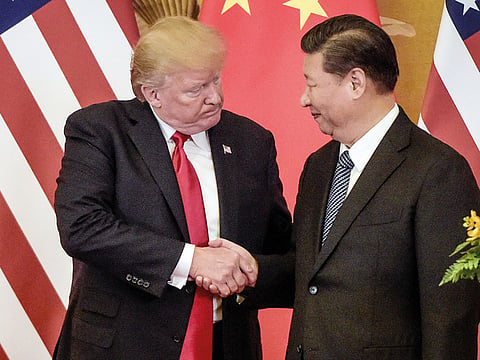The US and China keep escalating trade tiffs
Currency is the latest weapon, but neither side can claim a decisive edge

The US-China trade war intensifies, taking an ever more serious turn by the day and having many implications on economies all over. This is because its effects have extended to include new and influential areas, like monetary policies and on the financial sector. These will have grave repercussions on the global economy.
Last week, US President Donald Trump announced a new round of punitive tariffs on Chinese goods, imposing extra duties on US imports worth $300 billion from China. In a quick and severe reaction, China has devalued its national currency, dropping the yuan to seven plus to a dollar. The Chinese move has angered Trump, who fully realises the consequences of this step on the competitiveness of Chinese goods in international markets.
If the US-China relation were just limited to bilateral currency war within the wider trade war, things would be fine. However, the problem is this issue has dramatic repercussions on all fronts, including stock markets which have slumped significantly while oil prices fell 15 per cent to as low as $56 a barrel for Brent crude. In retaliation, Trump has called on the Federal Reserve to lower interest rates to influence the rate of the dollar against other currencies.
No knowing the consequences
These moves signal a serious escalation in the original trade war and it might go on to impact on political, military and strategic relations. Although the US President has taken this initiative to try and score a decisive win in the trade war, his position on using monetary instruments seems weak.
This is because the Chinese government has direct powers to control the currency exchange rates, including interest rates, while Trump is missing out on a say on such an important financial instrument. The US monetary policy is independent from the administration and is determined by the Fed’s board of governors, creating a gap between the White House and the central bank, which rejects Trump’s suggestions to cut interest rates.
No Presidential influence
In turn, Trump is trying his utmost to increase pressure on the Fed Governor, Jerome Powell, to slash interest rates, threatening to dismiss him from his post and change the board of governors. This has prompted four ex-governors of the Fed to call for maintaining independence in making decisions away from the White House. This call has put Trump in an embarrassing situation, and greatly reduced his ability to confront the Chinese Dragon on the currency front. It in turn hands China extra power to wield a powerful bargaining chip in the trade war.
China has been able to rapidly find alternative export sources for its exports, which increased 3.3 per cent in July. While China’s tech giant Huawei, which has been severely affected by the trade war, lost an important global market, it quickly found its own alternative operating system to replace the Google-owned Android. Last week, it unveiled the HarmonyOS, which can be used in most smartphones, including Android ones.
This indicates that the Chinese economy has become so powerful to the extent it can compete with the US and even raise the stakes further. Although China has suffered huge losses because of this war, the US and the rest of the world, including oil-producing countries, will definitely incur losses if the trade war continues.
This will undoubtedly lead to a further slowdown for the world economy, and consequently low levels in oil demand, which in turn will lead to more pressure on prices that may fall further. This despite the endeavours by Opec countries to ensure a balance and maintain current prices.
Nevertheless, there is light at the end of the tunnel, which is that the inclusion of the monetary sector within the trade war may lead to a balance of power, leaning in favour of the US. Such a balance can lead to negotiations to find a compromise to avert significant escalations and save the world more troubles if such an absurd war continues.
Sign up for the Daily Briefing
Get the latest news and updates straight to your inbox


